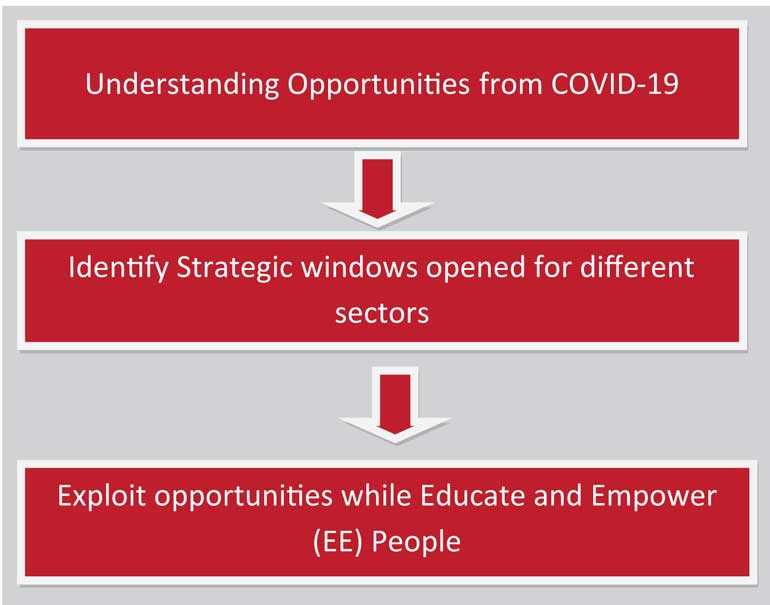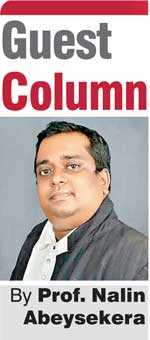Friday Feb 20, 2026
Friday Feb 20, 2026
Tuesday, 23 June 2020 00:45 - - {{hitsCtrl.values.hits}}

At the moment we can see people start to talk about ‘COVID-19’ as an opportunity. It is clear that the ‘Strategic window’ is opened for Sri Lanka. There is a need to study the best practices of different countries and you should be innovative as well.

The collaboration of corporate leaders and opinion leaders (religious leaders and others who have the ability to influence public opinion) are very important in this context. They should identify strategic windows opened in many sectors and try to exploit them while educating and empowering the general public and employees.
In Sri Lanka, we can witness when whatever disaster happened people panic and try to do something different. But in case things get settled (after the disaster) again you can see the ‘same person’ with no ‘sense’ (‘Sense’ – this is in case of the damage which has happened due to the disaster and their duty and responsibility as a citizen to overcome this). So the role of educating and empowering people on this is a must. We can simply propose the model of EE (Educate and Empower) on this. This is to motivate people with a sense of belongingness. All Sri Lankans should understand their role as responsible citizens in this crisis situation.
We can discuss this with a small example. The emergence of ‘Nollywood’ is remarkable and it came into the world picture within 20 years. According to PwC.com, “The Nigerian film industry (Nollywood) is globally recognised as the second largest film producer in the world. The industry is a significant part of the arts, entertainment and recreation sector which contributed 2.3% (NGN 239 billion) to Nigeria’s Gross Domestic Product (GDP) in 2016. It is one of the priority sectors identified in the Economic Recovery and Growth Plan of the Federal Government of Nigeria with a planned $ 1 billion in export revenue by 2020.”
We have to study the success story of ‘Nollywood’ to see whether we can apply that to our Ranminithenna Film Village which also with more potentials (Nollywood Vs Ranminitenna-Abeysekera, 2012). University undergrads in Sri Lanka can do a study on ‘Nollywood’ and see the Key Successive Factors (KSF) and uniqueness in the film industry. We can then see how we can apply these models (with some modifications) in the Sri Lankan context with Ranminithenna.
As an example you can study best practices and the need to exploit your underutilised resources (in our case it is Ranminithenna). Then we need to educate and empower our plan to employees in Ranminithenna. People who are in the Ranminithenna village also need to be educated and empowered. Then you can see you get your vision done by your people with the sense of ‘belongingness’.
Sri Lanka is a country which has more than 48,000 years of rich civilisation. Refer the recent report (12 June 2020) of CNN below:
“Last year, researchers released a study analysing monkey and squirrel bones found in the Fa-Hien Lena cave on the island; the research revealed that early humans hunted them. This cave is also the site of the earliest fossil appearance of Homo sapiens in South Asia. Humans occupied the area during four different time periods between 4,000 and 48,000 years ago. Some of the bones in the cave had been fashioned into tools, so the researchers analysed them to understand how our early ancestors managed to successfully hunt such quick-moving small animals in the rainforest. Beneath a microscope, the tools revealed the story.
“The fractures on the points indicate damage through high-powered impact – something usually seen in the use of bow-and-arrow hunting of animals,” said Michelle Langley, lead study author and senior lecturer of forensics and archaeology at Griffith University, in a statement. “This evidence is earlier than similar findings in Southeast Asia 32,000 years ago. The study was published Friday in the journal Science Advances (https://edition.cnn.com/2020/06/12/world/bow-arrows-sri-lanka-cave-scn/index.html)”.
Hence the duty of all Sri Lankans is to read the history, understand the situation, help each other and act as responsible citizens.
(The writer is Professor in Management Studies at Open University of Sri Lanka. You can reach Professor Abeysekera on [email protected].)